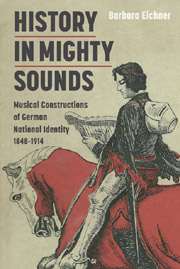Book contents
- Frontmatter
- Contents
- List of Illustrations
- List of Music Examples
- Acknowledgements
- Abbreviations
- Dedication
- Introduction
- 1 The Pure Mirror: National Epic as National Opera
- 2 Germanic Heroes for Modern Germans: Gender and the Nation
- 3 Lost in Transfiguration: Redemption Operas in the Fin de siècle
- 4 The Sacred Nation and the Singing Nation: The Choral Movements
- 5 Symphonic Visions from the Periphery
- Bibliography
- Index
1 - The Pure Mirror: National Epic as National Opera
Published online by Cambridge University Press: 05 February 2013
- Frontmatter
- Contents
- List of Illustrations
- List of Music Examples
- Acknowledgements
- Abbreviations
- Dedication
- Introduction
- 1 The Pure Mirror: National Epic as National Opera
- 2 Germanic Heroes for Modern Germans: Gender and the Nation
- 3 Lost in Transfiguration: Redemption Operas in the Fin de siècle
- 4 The Sacred Nation and the Singing Nation: The Choral Movements
- 5 Symphonic Visions from the Periphery
- Bibliography
- Index
Summary
If German national identity was in a permanent state of crisis and redefinition throughout the nineteenth century, the same can be said of German national opera. Until Wagner's music dramas finally – and not without controversy – came to be adopted as the ‘soundtrack’ of the German Empire in the 1870s, the search for an appropriate and recognisable operatic idiom remained an ongoing concern. The two operas discussed in this chapter, Heinrich Dorn's Die Nibelungen (1854) and Carl Amand Mangold's Gudrun (1851), made significant and at the time most welcome contributions to the problematic genre by transforming epic poetry from the treasure-trove of medieval German literature into glorifications of the national character. ‘Treue’ (loyalty or constancy) and ‘Freiheitsliebe’ (love of freedom) are central to the two operas, which have been chosen not just for their topicality – no discussion of German national myth would be complete without consideration of the Nibelung tradition – but also for the impassioned responses they engendered in contemporary observers who eagerly tested each new artwork for its suitability as the desired national opera.
The creation of a national theatre and by extension a national opera can in itself be considered an act of cultural politics, a project that was intended to elevate the German language to the serious stage and to remove the perceived hegemony of foreign drama and opera. From the late eighteenth century onwards opera had been an essential item on the agenda of progressive thinkers such as Johann Gottfried Herder.
- Type
- Chapter
- Information
- History in Mighty SoundsMusical Constructions of German National Identity, 1848-1914, pp. 41 - 80Publisher: Boydell & BrewerPrint publication year: 2012



